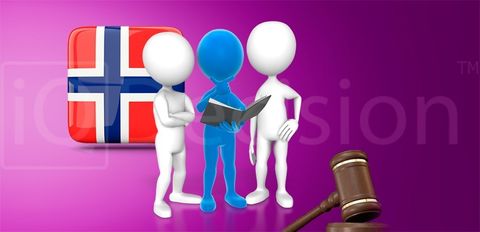If you are faced with the need to resolve a dispute in Norway, then our blog post will be useful as it provides a brief overview of the litigation specifics in this Scandinavian country.
Dispute resolution in Norway: principles of orality
Civil litigation in Norway is governed by the Dispute Act. It is based on the principles of orality, that is, the right of the parties to free expression. The court can only make a decision on the basis of what was said or contested in the course of the dispute resolution in Norway. Oral argument offers an opportunity for a direct interchange of ideas between all the litigation process participants.
All written evidence must be presented to the court before the start of the trial, and not during it.
Another important principle at the heart of the Norwegian legal process is the principle of free disposal. It gives the parties the right to apply for assistance. The court's decision depends on such a request. The primary responsibility for presenting evidence in a Norwegian court settlement lies with the parties involved.
Proceedings in Norway
Litigation in Norway begins by filing a statement of claim with a district court or conciliation commission. It must mention any objections or grounds for rejecting the decision.
If the defendant does not present his objections to the claim within the time period established by the court, the decision will be made in absentia. The main thing that will be taken into account, in this case, is the position of the plaintiff and his claims.
After receiving the objections to the claim, the court will schedule a preparatory meeting during which procedural issues and the schedule of hearings will be clarified. Quite often on the agenda is the question of the possibility of resolving disputes through mediation.
Judicial mediation
Court-assisted mediation is extremely popular especially in the resolution of commercial disputes in Norway. Here, a judge or a court-appointed expert acts as a mediator. Judicial mediation can be used at every stage of a case. Courts are interested in this form of dispute settlement through mediation in Norway.
Filing class actions in Norway
The institution of class actions as a tool for protecting the rights of a group of individuals before an economically stronger party has proven itself extremely positively in common law countries, where it was born. In Norway, this tool has existed not so long ago - only 12 years.
Court decisions on class actions can simultaneously protect the interests of a large circle of persons, which, on the one hand, allows to reduce the burden on the courts, and on the other hand, allows to maintain a balance between protecting public law and individual interests. Such claims may be filed, in particular, against tour operators/airlines, etc.
The main feature of a class action claim is that, if satisfied, the court's decision will be binding on all members of the group who potentially suffered losses from the actions of the defendant, even if such persons did not directly participate in the case.
The factor of choosing a representative who will act in the court in the interests of the affected group of persons is extremely important. The possibility of satisfying a claim, which applies to a wide range of persons, depends largely on the professionalism and qualifications of the representative.
Surprisingly, class action lawsuits are rare in Norway.
We have provided for your information a brief overview of the basic principles of legal proceedings in Norway. It should be noted that the Norwegians often prefer methods of peaceful dispute resolution instead of going to courts. The country actively encourages dispute resolution through arbitration and mediation. For all methods of alternative dispute resolution in Norway, you can consult our experienced professionals. Please ring us up or fill out the form below for a quick connection.














